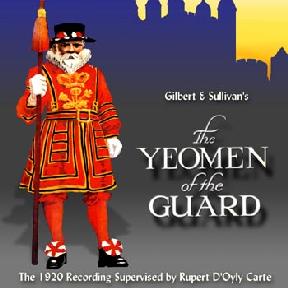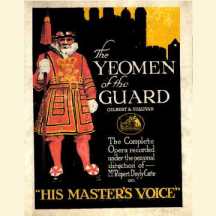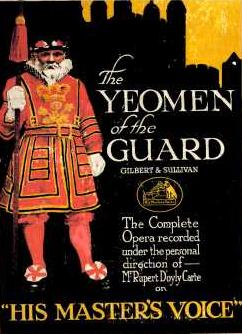The 1920 HMV Yeomen
Chorus: Sarah Jones, Walter Glynne, and the soloists Conductor: George. W. Byng Recorded in London, 4 March–2 October 1920 |
|
 Sounds on CD VGS216 Cover art by Matt Bland |
In 1917, HMV began a series of G&S recordings "under the direction of Rupert D'Oyly Carte," but maintained its long-standing policy of using its own stable of recording artists rather than D'Oyly Carte singers. Over time, this policy came to be seen as outmoded, particularly given the rival Columbia Company's policy of issuing records "of theatrical musical productions by the artists whose names are associated with the theatres themselves." Bowing to the pressure, HMV ordered test pressings of four D'Oyly Carte singers: Henry Lytton, Leo Sheffield, Derek Oldham and Bertha Lewis. Incredibly, HMV management concluded that only Oldham "would be of any use in forming the [recorded] cast of the Gilbert and Sullivan operas."
Since Oldham had passed the test, he got to record Fairfax in this recording of Yeomen, while the others would wait a few years more for their gramophone debuts. This was particularly shameful in Lytton's case. He is widely considered one of the greatest comedians the Company ever employed, and yet he only got to record four of his roles. (Sheffield would eventually record seven of his, and Lewis nearly all of hers.)
Aside from the presence of Oldham, the cast is the familiar bunch who recorded the 1917 Mikado and the 1919 Gondoliers. As with the two earlier recordings, there is significant confusion in the role assignments, with the doubly-cast roles breaking down as follows:
- Sgt. Meryll:
- Baker sings the Act I finale; Dawson sings the rest of the role.
- Lt. Cholmondely:
- Radford sings "How say you, maiden"; Halland sings the Act I finale and all of Act II. (The discs actually credit Radford in the Act I finale. It seems likely that Halland sang "Astounding news...," or else Radford would have been answering himself as Wilfred, with the line "My lord, I did not set him free." This possibility cannot be completely discounted, but I am assuming that Halland sang that line.)
- Phoebe:
- Walker sings "When maiden loves," "Were I thy bride," part of the Act I finale and "A man who would woo a fair maid"; Heyl sings "Alas, I waver to and fro," part of the Act I finale, "When a wooer goes a-wooing" and the Act II finale.
- Second Yeoman:
- Dawson sings "Tower warders"; Radford sings "Didst thou not, oh, Leonard Meryll".
 "78s 2 CD" GS01 |
The opera was recorded initially in four sessions, two in March and two more in May, 1920. (As initially published, the set also included an "Instrumental Selection" that was recorded on a separate date.)
After hearing the records, Rupert D'Oyly Carte had two significant objections. He found Ruby Heyl's Phoebe "quite unsuitable," observing that "Her voice is far too heavy and mature in quality." He also found George Baker too robust a jester, observing that, in the Act II finale, he "[did] not convey in the least that the man was on the point of collapse."
Owing to these objections, three more sessions were scheduled. All of Phoebe's significant solo music was re-recorded, with Nellie Walker replacing Ruby Heyl (although Heyl's parts in the concerted numbers were allowed to remain in the set). And, the end of Act II was re-recorded for Baker to become more broken-hearted. The details of the recording sessions are presented in the "Recording Sessions" table, below.
The casting of the Lieutenant presents some confusion. From the record labels, one would conclude that Radford sings the role throughout Act I and Halland throughout Act II. However, this arrangement would have Radford singing "Astounding news, the prisoner fled..." and then answering himself with Shadbolt's line, "My lord, I did not set him free." It seems more likely that Halland sang the Lieutenant in the Act I finale (he was clearly present during the recording session), although it is difficult to tell from listening to the side.
Derek Oldham sang Fairfax again on the 1928 Yeomen, which also has the advantage of being an electrical set and having D'Oyly Carte performers in most of the roles. However, for those with a taste for vintage recordings, Chris Webster "Sounds on CD" and 78s 2 CD have each issued the recording on CD at an extremely reasonable price.
Review from The Gramophone, 1927
| Date | Label | Format | Number | Comments |
|---|---|---|---|---|
| 1920 | HMV | 78rpm | D 481/5, D 496/501 | See table below for allocation of catalog numbers to sides |
| 1998 | 78s 2 CD | CD | GS01 | |
| 2000 | Sounds on CD | CD | VGS216 | |
| 2001 | 78s 2 CD | CD | GS01C | This version is the same transfer as the other Lockwood issue listed above, but it is on 2 CDs. In addition to the standard recording, the separate Orchestral Selection, which was side 2 of the original published set, is included. Also, there is a bonus track, "Thou art passing hence," sung by Peter Dawson. (Early purchasers of GS01 received this two CD set, but currently it is a special order.) |
| Side Nbr | Matrix Number | Cat Nbr |
Selection | Rec. Date |
|---|---|---|---|---|
| 1 | HO4299-2 | D481 |
|
18 Mar 20 |
| 2 | HO4461-1 |
|
6 Jul 20 | |
| 3 | HO4516-2 | D496 |
|
31 Aug 20 |
| 4 | HO4300-2 |
|
18 Mar 20 | |
| 5 | HO4301-2 | D482 |
|
18 Mar 20 |
| 6 | HO4287-1 |
|
4 Mar 20 | |
| 7 | HO4302-2 | D497 |
|
18 Mar 20 |
| 8 | HO4284-1 HO4284-2 |
|
4 Mar 20 | |
| 9 | HO4285-1 HO4285-2 | D498 |
|
4 Mar 20 |
| 10 | HO4521-2 |
|
2 Sep 20 | |
| 11 | HO4397-2 | D499 |
|
21 May 20 |
| 12 | HO4522-1 |
|
2 Sep 20 | |
| 13 | HO4411-1 | D483 |
|
27 May 20 |
| 14 | HO4303-1 HO4303-2 |
|
18 Mar 20 | |
| 15 | HO4282-1 | D484 |
|
4 Mar 20 |
| 16 | HO4283-2 |
|
4 Mar 20 | |
| 17 | HO4399-2 | D485 |
|
21 May 20 |
| 18 | HO4409-1 HO4409-2 |
|
27 May 20 | |
| 19 | HO4518-2 | D500 |
|
31 Aug 20 |
| 20 | HO4400-2 |
|
21 May 20 | |
| 21 | HO4410-2 | D501 |
|
27 May 20 |
| 22 | HO4549-1 |
|
4 Oct 20 |
Notes:
-
Francis does not note any instances
of multiple takes published under the same catalogue number. Francis has:
- For side 8: HO4284
- For side 9: Ho4285
- For side 14: HO4303
- For side 18: HO4409-1
For all of these, Chris Webster, Michael Walters, James Lockwood, and other correspondents have verified the existence of multiple published takes.
- Substantial excerpts from this recording were included on Pearl GEM 125, a Derek Oldham retrospective disc.
- Sides 20 & 22 were included on Arabesque's LP reissue of the 1931 Ruddigore.
| Result | Matrix Number |
Selection |
|---|---|---|
| Session One, 4 March 1920 | ||
| Issued s. 15 | HO4282-1-2 |
|
| Issued s. 16 | HO4283-1-2 |
|
| Issued s. 8 | HO4284-1-2 |
|
| Issued s. 9 | HO4285-1-2 |
|
| Rejected | HO4286-1-2 |
|
| Issued s. 6 | HO4287-1-2 |
|
| Rejected | HO4288-1-2 |
|
| Session Two, 18 March 1920 | ||
| Issued s. 1 | HO4299-1-2 |
|
| Issued s. 4 | HO4300-1-2 |
|
| Issued s. 5 | HO4301-1-2 |
|
| Issued s. 7 | HO4302-1-2 |
|
| Issued s. 14 | HO4303-1-2 |
|
| Rejected | HO4304-1 |
|
| Session Three, 21 May 1920 | ||
| Rejected | HO4396-1-2 |
|
| Issued s. 11 | HO4397-1-2 |
|
| Rejected | HO4398-1-2 |
|
| Issued s. 17 | HO4399-1-2 |
|
| Issued s. 20 | HO4400-1-2 |
|
| Rejected | HO4401-1-2 |
|
| Session Four, 27 May 1920 | ||
| Issued s. 18 | HO4409-1-2 |
|
| Issued s. 21 | HO4410-1-2 |
|
| Issued s. 13 | HO4411-1-2 |
|
| Session Five, 31 August 1920 | ||
| Issued s. 3 | HO4516-1-2-3 |
|
| HO4517 |
| |
| Issued s. 19 | HO4518-1-2 |
|
| Session Six, 2 September 1920 | ||
| HO4519 |
| |
| HO4520 |
| |
| Issued s. 10 | HO4521-1-2 |
|
| Issued s. 12 | HO4522-1-2 |
|
| Session Seven, 4 October 1920 | ||
| HO4548 |
| |
| Issued s. 22 | HO4549-1-2 |
|
| HO4550 |
| |
Notes:
- The table above presents both the published sides and the rejected takes in the order recorded. The identification of the artists on each side and the details of the rejected takes were supplied by Chris Webster, who in turn obtained transcriptions of the original HMV artist sheets from his colleague, Alan Kelly.
- In the table, the "result" column indicates whether a matrix was issued or rejected. If a matrix was rejected, then the entire row is printed in italics. For issued sides, the published matrix numbers are underlined. For example, the designation "HO4282-1-2" (see the first row, below) indicates that there were two takes for matrix HO4282, of which the first was published.
- Francis gives the date of Session Four as 26 May 1920. Chris Webster, who has seen two different transcriptions of the artist sheets, confirms that the date was 27th May.
- On 18th June 1920, an ensemble called the Mayfair Orchestra recorded a single unpublished take for the Instrumental Selection, mat. HO4443. There were two more takes on 6th July (HO4461-1-2), the first being the published take. These are not shown in the table above. The artist sheets for the 6th July session mistakenly describe the selection as part two of the overture, which it is not.
- On matrix 4398, the HMV artist sheets do not include Edward Halland, but someone called W.&Clarke instead. This is the only mention of W.&Clarke anywhere for this recording, and as Halland participated in all the other sides recorded during this session, the mention of Clarke may very well be a mistake.
- On matrix 4401, the HMV artist sheets do not list the chorus. The men likely would have included all of those present at the session, viz., Baker, Pike, Radford, Glynne and Halland. The women would certainly have included Heyl, B.&Jones, Thornton, and possibly Walker and S. Jones.

